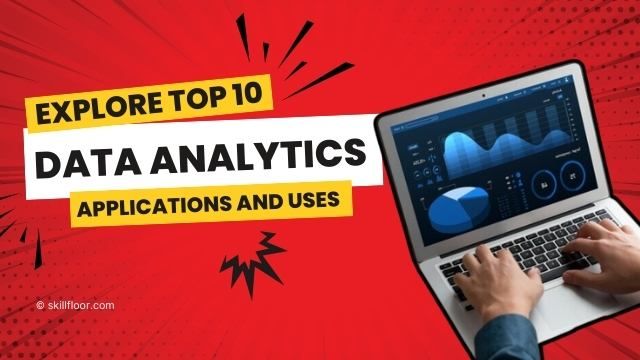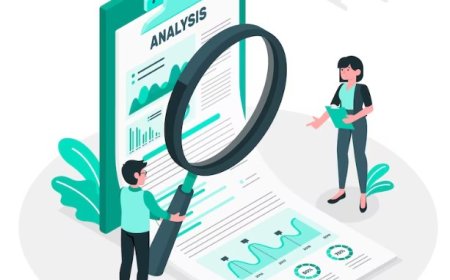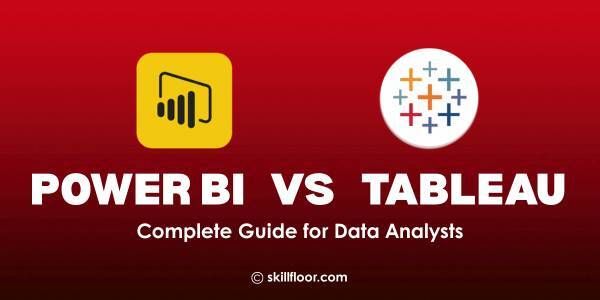Top 10 Data Analytics Applications and its Uses
Top 10 data analytics applications improving decision-making and efficiency across industries like retail, healthcare, and finance

It was clear to me when I first joined the field of data analytics that I had found a field as large and interesting as the data it uses. I learned how data might turn difficult information into understandable, useful insights with each data analytics course, project, and analysis. I've had the pleasure of working with various organisations over the years, and I've seen firsthand how data analytics applications have transformed everything from global logistics to small business strategy.
Data analytics applications are now essential in many different industries. The more data we have, the more tools we need to make sense of it. Analytics is one such tool. Data analytics is now important to the decision-making process, whether it is in the retail industry for predicting customer behaviour or in the healthcare industry for monitoring patient care. Let's explore the top 10 uses of data analytics and why they have become so beneficial to businesses all around the world for anyone interested in how data-driven decisions are influencing various industries.
What is Data Analytics?
Let's define data analytics before exploring specific applications. Analyzing raw datasets to find trends, patterns, or insights that can guide choices is known as data analytics. It uses a range of methods, from advanced machine learning to simple statistical analysis. The ultimate goal of data analytics is to transform large amounts of information into knowledge that can be understood and used.
Why Are Data Analytics Applications So Valuable?
Data analytics applications are useful because they help companies make better decisions by simplifying processes and offering insights. By pointing out patterns and predicting future trends, these tools help make sense of data. Data analytics is important in every industry since the possibilities for applications keep growing as data availability and storage capacity increase. Because so much data is produced every day, doing analytics has become a necessary skill rather than a desired one. Let's now explore the most popular uses of data analytics and their unique applications across a range of industries.
10 Data Analytics Applications and its Uses
Data analytics applications help companies turn unprocessed data into insights that can be put to use, enhancing operational effectiveness and decision-making. Industries may predict trends, streamline operations, and provide customers with individualized experiences using data-driven tools.

1. Customer Analytics in Retail
The retail sector has changed as a result of customer analytics, which helps companies better understand and forecast customer behaviour. Retailers can adjust their methods to better satisfy client wants by looking at data from previous purchases, customer demographics, and even web surfing patterns.
How It Works
Retailers may predict product demand, develop targeted promotions, and modify inventory by using customer data analytics apps to assess purchase habits. Customers can enjoy a more customized purchasing experience thanks to this data-driven strategy.
Use Case Example
Consider a large department shop that analyzes customer purchases to determine the best-selling seasonal items. They can increase sales and decrease the number of out-of-stock items by determining which products are the most popular and making sure they are properly stored.
2. Predictive Maintenance in Manufacturing
Manufacturers depend on machinery that runs safely and effectively. A data analytics tool called predictive maintenance helps predict equipment problems, minimizing downtime and increasing efficiency.
How It Works
Predictive analytics can identify unusual behaviour patterns that frequently indicate a need for maintenance by using sensor data from machines. Businesses can prevent expensive repairs and unexpected malfunctions by identifying these early warning signs.
Use Case Example
For example, an automobile factory uses data analytics tools to keep an eye on the state of its assembly line equipment. The business reduces downtime by anticipating and resolving possible problems before they develop, ensuring consistent product quality and stable production.
3. Fraud Detection in Finance
For banks and other financial institutions, financial fraud is a serious problem that costs them millions of dollars annually. One of the most useful data analytics tools is fraud detection, which enables businesses to promptly identify questionable transactions and safeguard accounts for customers.
How It Works
Fraud detection systems identify unusual activity and flag it for additional inquiry by examining transaction patterns and customer routines. By using machine learning to improve their accuracy over time, these data analytics tools lower the possibility of false positives.
Use Case Example
An application for fraud detection may be used by a bank to monitor irregularities in consumer transactions. The system alerts the bank and asks the account holder to confirm if a customer's account contains an unusually large amount of transactions from a foreign nation.
4. Patient Care Improvement in Healthcare
Data analytics is also having a significant positive impact on the healthcare industry. Healthcare professionals may predict patient outcomes, understand the effectiveness of treatments, and personalize care plans by analyzing patient data.
How It Works
Healthcare professionals may predict hazards, understand illness progression, and even determine preventive steps by using past patient data. Applications of data analytics in healthcare enable providers to quickly assess enormous datasets, improving patient outcomes and enabling more effective therapies.
Use Case Example
To identify common factors impacting healing times, a hospital may examine data from patients with comparable conditions. By using this data, physicians can improve treatment outcomes and patient satisfaction by customizing care plans for future patients.
5. Supply Chain Optimization in Logistics
Supply chain management and logistics involve complex relationships of suppliers, schedules, and resources. Businesses may optimize these networks to decrease expenses, improve customer service, and streamline operations with data analytics apps.
How It Works
Logistics companies can identify the most effective routes and delivery strategies by using data analytics to examine past shipping data, seasonal demand variations, and fuel prices. This lowers costs and improves delivery precision.
Use Case Example
To find bottlenecks and high-traffic locations, a multinational shipping corporation may employ data analytics to examine previous delivery routes. They can save time and cut down on fuel use by modifying routes based on this data.
6. Human Resources and Workforce Management
Data analytics applications are being used more and more by human resources departments for hiring, employee performance, and retention. By helping HR teams make well-informed hiring and training decisions, these solutions eventually increase worker productivity.
How It Works
Applications for data analytics assist HR managers in assessing employee performance indicators, forecasting attrition rates, and determining the characteristics that distinguish high performers. Better hiring and employee management are the results of this data-driven strategy.
Use Case Example
A big business can employ data analytics to analyze the abilities and characteristics of successful workers in a particular position, and then use the results to improve retention and future hiring procedures.
7. Energy Consumption Optimization
Data analytics is used by the energy industry to estimate demand, track use, and lessen its impact on the environment. Businesses may save expenses, maximize energy use, and advance sustainability with data analytics tools.
How It Works
In order to predict demand, track consumption patterns, and modify grid performance, energy suppliers gather data from smart meters and use analytics. Customers who want to understand their consumption can also find this information useful.
Use Case Example
To avoid overloading the grid and cutting down on waste, a city may employ data analytics to track energy consumption in different neighbourhoods and modify supply levels effectively. This supports general environmental initiatives and keeps service constant.

8. Marketing Optimization
Applications for data analytics are now essential to marketing since they enable companies to monitor campaign performance, understand customer behaviour, and make data-driven decisions. Businesses may develop more individualized and relevant campaigns with the use of marketing data.
How It Works
Marketers examine audience engagement using data from email marketing, social media, and website engagements. Businesses can use this information to customize their strategy and content, resulting in more successful campaigns.
Use Case Example
Data analytics may be used by an online company to divide up their customers and develop marketing specifically for each category. They improve conversion rates and create closer bonds with customers by creating communications.
9. Risk Management in Insurance
In the insurance field, risk management is essential since businesses must estimate possible losses and set premiums appropriately. Applications for data analytics enable insurers to improve risk models, giving customers more precise and fair prices.
How It Works
To determine risk, insurance companies analyze a variety of information, including medical histories and driving records. By using data analytics, they may find trends and develop customized risk profiles, which increases the accuracy of underwriting.
Use Case Example
For example, a health insurance company may employ data analytics to monitor claim patterns, spot high-risk populations, and modify coverage plans to better control risk.
10. Smart City Development
From controlling traffic and energy use to improving public services, smart cities use data analytics to make urban living easier. Cities are able to handle issues like traffic, pollution, and resource distribution by utilizing data analytics.
How It Works
Smart cities may assess and improve in real-time by gathering data from local infrastructure, such as utilities, environmental sensors, and traffic cameras. Residents' quality of life and resource management both increase as a result.
Use Case Example
Traffic analytics could be used by a city to track and modify signal timing in response to patterns in traffic flow. By maintaining smooth traffic flow, this lessens congestion, commuting times, and even pollution.
The Future of Data Analytics Applications
The discussion of applications is only the first step. Applications for data analytics will develop further as technology progresses, incorporating artificial intelligence and machine learning to provide ever more profound insights and the ability to predict. Data analytics are going to be essential in domains such as renewable energy, personalized health, and autonomous driving. More informed judgments, better-optimized systems, and ultimately more effective solutions to difficult problems will result from data analytics' increasing significance.
Best Practices for Implementing Data Analytics Applications
A few recommended practices are necessary for the successful implementation of data analytics applications:
-
Set Specific Goals: Prior to beginning data analysis, it is crucial to establish clear goals. Knowing your goals aids in choosing the appropriate information and methods.
-
Prioritize Data Quality: Accurate data is necessary for trustworthy insights. To make sure the data you're working with is trustworthy, invest in data cleansing and validation procedures.
-
Start with Simple Analytics: Before advancing to more sophisticated techniques like machine learning, firms that are new to data analytics should establish a foundation by beginning with simple statistical studies.
-
Build Your Team: For analytics projects to be successful, an experienced group is essential. Invest in continuous training to keep your staff knowledgeable about the newest methods and resources.
-
Create a Data-Driven Culture: Encourage departments to integrate data insights into their daily operations to promote a culture of data-driven decision-making.
Applications of data analytics have transformed industries by offering strong instruments for operational analysis, prediction, and improvement. Data analytics enables better decision-making in a variety of industries, including retail, healthcare, logistics, and energy, increasing productivity and improving customer satisfaction. The benefits of using data-driven decision-making for businesses are apparent: reduced expenses, streamlined operations, and a competitive edge in the marketplace.
The effect of data analytics will only increase with the field's growth, creating new opportunities and applications in a variety of industries. Adopting these tools is not just a trend; it is essential for any company expecting to succeed in the data-driven world of today.































































